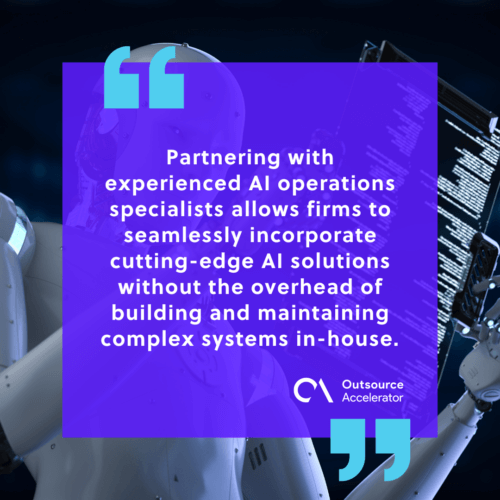Decoding AI operations outsourcing: How outsourcing firms can help

The integration of artificial intelligence (AI) has become more than just a competitive advantage—it’s a necessity.
AI is revolutionizing how companies operate, from automating mundane tasks to providing deep insights through advanced data analytics. However, leveraging AI to its full potential requires expertise and resources that many companies may not possess internally.
This is where outsourcing to leading firms comes into play.
In this article, discover why AI operations outsourcing might be the strategic move your company needs to thrive.
How AI operations work
Artificial Intelligence (AI) operations involve using advanced algorithms and machine learning models to automate and optimize various business processes.
At its core, AI operations leverage large datasets to identify patterns, make predictions, and automate decision-making.
Here’s a general overview of how it works in businesses:
- Data collection and processing. AI systems gather data from various sources. All information is then cleaned and processed to ensure accuracy and relevance.
- Algorithm development. Data scientists develop and train algorithms using ML techniques designed to recognize patterns and make decisions based on the processed data.
- Integration and automation. Once trained, AI models are integrated into business systems.
- Continuous learning and improvement. AI systems continuously learn from new data to improve accuracy and efficiency over time, adapting to changing business environments.
- Monitoring and maintenance. Businesses need to monitor AI operations to ensure they function correctly and deliver the desired outcomes.
Partnering with experienced AI operations specialists allows firms to seamlessly incorporate cutting-edge AI solutions without the overhead of building and maintaining complex systems in-house.
Leading third-party providers offer a comprehensive suite of AI operations services tailored to each client’s unique needs, ensuring a smooth integration process and ongoing support.
An experienced software development company like Itransition would be a great fit for these needs.

Benefits of outsourcing AI operations
Outsourcing artificial intelligence solutions offers businesses a strategic advantage, as they can fully harness the power of artificial intelligence.
Here are some key benefits of AI operations outsourcing:
1. Cost efficiency
Outsourcing AI processes eliminates the need for substantial upfront investment in infrastructure and talent.
Businesses can access state-of-the-art AI technologies and skilled professionals at a fraction of the cost of developing these capabilities in-house.
2. Access to expertise
Leading AI outsourcing firms possess deep expertise and experience in implementing AI solutions across various industries.
This specialized knowledge ensures that businesses can deploy effective and sophisticated artificial intelligence systems tailored to their specific needs.
3. Scalability
Outsourced AI services offer scalability. Businesses can easily adjust the scope of their AI operations based on demand.
AI outsourcing’s flexibility is particularly beneficial for companies experiencing rapid growth or those with fluctuating workloads.
4. Faster implementation
With established processes and experienced teams, AI operations outsourcing providers can deploy AI solutions more quickly than internal teams. A rapid implementation enables businesses to start reaping the benefits of AI sooner.
5. Focus on core business
By outsourcing AI operations, companies can focus on their core business activities without being distracted by the complexities of managing AI systems.
It allows them to allocate resources more efficiently and maintain their competitive edge.
6. Ongoing support and maintenance
AI outsourcing firms offer continuous support and maintenance, ensuring that AI systems remain up-to-date and operate smoothly. This proactive management minimizes downtime and addresses any issues promptly.
7. Innovation and competitive advantage
Outsourcing partners are often at the forefront of AI innovation, providing businesses with access to the latest advancements and best practices.
Through their unique AI operations outsourcing services, they help companies stay competitive and ahead in a rapidly evolving market.
Choosing the right AI operations outsourcing provider
Selecting the right AI operations outsourcing provider is a crucial decision for businesses looking to leverage artificial intelligence effectively.
With numerous outsourcing firms available in the market, it’s essential to consider several factors to ensure you partner with a provider that aligns with your needs and goals.
Here are five tips to help you navigate this process effectively:
1. Define your AI objectives clearly
Before searching for an outsourcing provider, define your AI objectives clearly. Determine the specific tasks or processes you intend to enhance or automate with AI, along with the desired outcomes.
Clear objectives will guide your search and help you identify a provider with the right expertise and capabilities to meet your needs.

2. Assess provider expertise and experience
Look for an outsourcing provider with proven expertise and experience in AI operations. Evaluate their track record by examining case studies, client testimonials, and industry recognition.
Consider factors such as the complexity of projects they’ve handled, the industries served, and the success rate of their AI implementations.
3. Evaluate technology stack and capabilities
Assess the technology stack and capabilities offered by potential providers to ensure they align with your requirements.
Consider factors such as the following:
- AI technologies supported (e.g., machine learning, natural language processing)
- Scalability
- Integration capabilities with your existing systems
- Data security measures
4. Consider cultural fit and communication
Effective communication and cultural fit are essential for a successful outsourcing partnership. Evaluate the provider’s communication channels and styles, initiatives, and eagerness to work with your team.
Check cultural compatibility by considering factors such as time zone differences, language proficiency, and cultural understanding.
5. Review service level agreements (SLAs) and support
Carefully review the service level agreements (SLAs) offered by potential providers to ensure they meet your expectations for performance, uptime, and support.
Pay attention to aspects such as response times, resolution processes for issues or escalations, and ongoing maintenance and support offerings post-implementation.
Additionally, consider the provider’s flexibility and ability to adapt to your evolving needs over time.
By following these tips, you can choose an AI operations outsourcing provider that aligns with your objectives, capabilities, and organizational culture. This sets the foundation for a successful partnership.







 Independent
Independent




